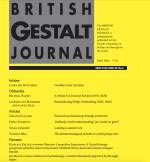
This article has been first published in the British Gestalt Journal Vol 29, n°2, 33-39 -
In this paper the author tries to give a sense of how and why the phenomenological attitude, when applied in a field perspective, is useful and operates in and on the therapeutic dyad, thus having an impact on the client’s lived world.
My recognition goes to Florence Belasco for her support, and with whom I have maintained a long and mutual companionship on these themes of clinical research and relational psychotherapy for almost ten years.
He starts by explaining the meaning of the phenomenological attitude in a therapeutical setting which he summarises as a deep listening and a genuine curiosity of the given of the situation. He then describes the therapist’s experience in the first person when engaged in a phenomenological attitude and its polarity of listening and reflecting. This attitude helps the therapist to meet their client differently, thus changing the whole field and possibly having a significant impact on the client.
For this to happen, the author offers a pragmatic compass – the Secret Longing – which he has developed with Florence Belasco at their Institute and which speaks directly to the heart of the therapist. He details how it can be applied on a clinical level, supporting the therapist in working on their primary task towards the client when adopting a field perspective. For the therapist, when caught at some stage in a relational impasse with the client, this task consists in listening more and being able to perceive and welcome the Secret Longing which is operating in the relationship.
This is precisely what helps to change the ‘intersubjective matrix’ from which the selves and worldviews of both client and therapist are constantly emerging.
Vincent Béja,
Past chair of the EAGT Research Committee, convening international conferences on Gestalt therapy research in Paris (2017) and Hamburg (2021), co-founder of the French Research Committee, former member of the AAGT Research Task Force.
Co-editor with Florence Belasco of the book La recherche en Gestalt-thérapie (2018), member of the editorial board of the Gestalt Therapy Book Series, and member of the reading committee of the Revue Gestalt for ten years.
He has written more than fourty articles on Gestalt therapy in various French and English- speaking journals and translated many others.
Co-founder of the IDeT (Institute for the Development of the Therapist) in Paris, France. He is currently a member of the SPR (Society for Psychotherapy Research) and the NYIGT (New York Institute for Gestalt Therapy).
This article was published in British Gestalt Journal 29.2.33-39 To read the full issue, please visit the British Gestalt Journal website.